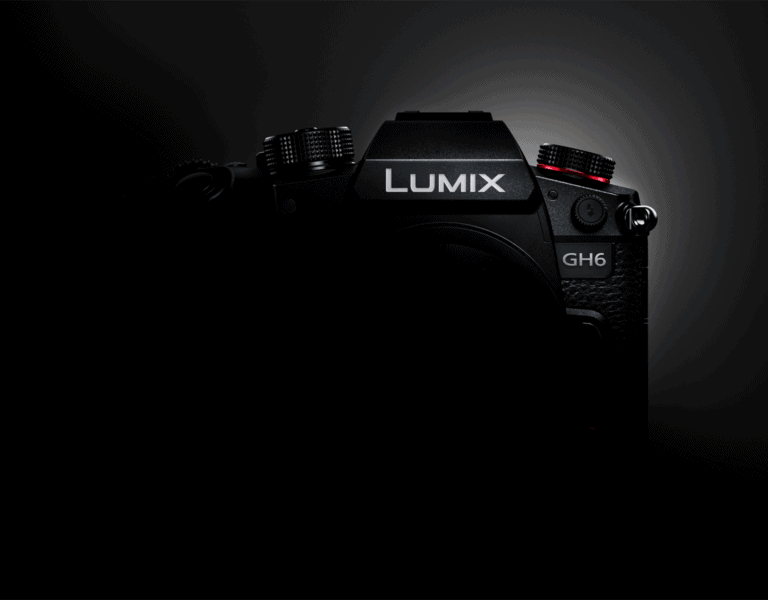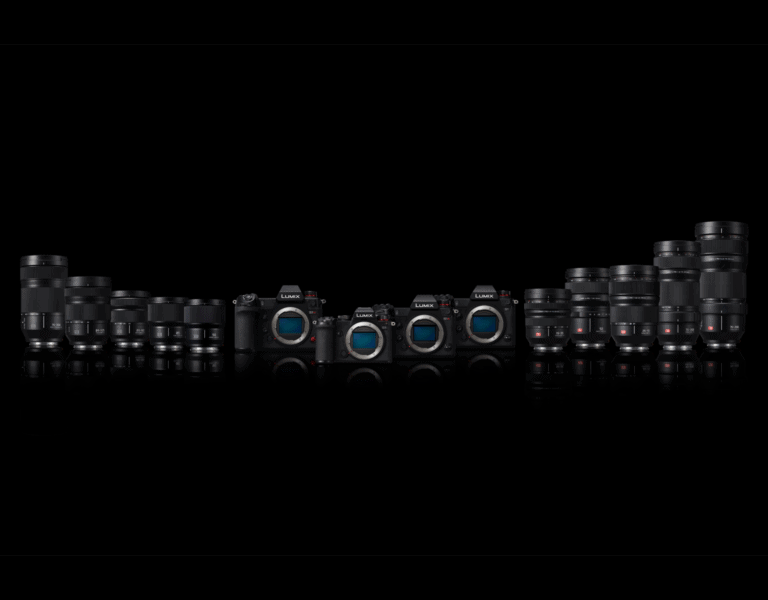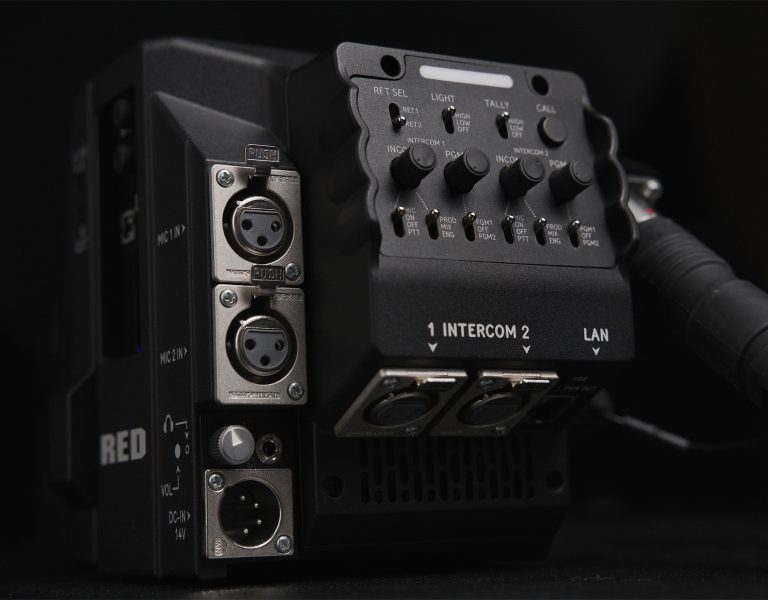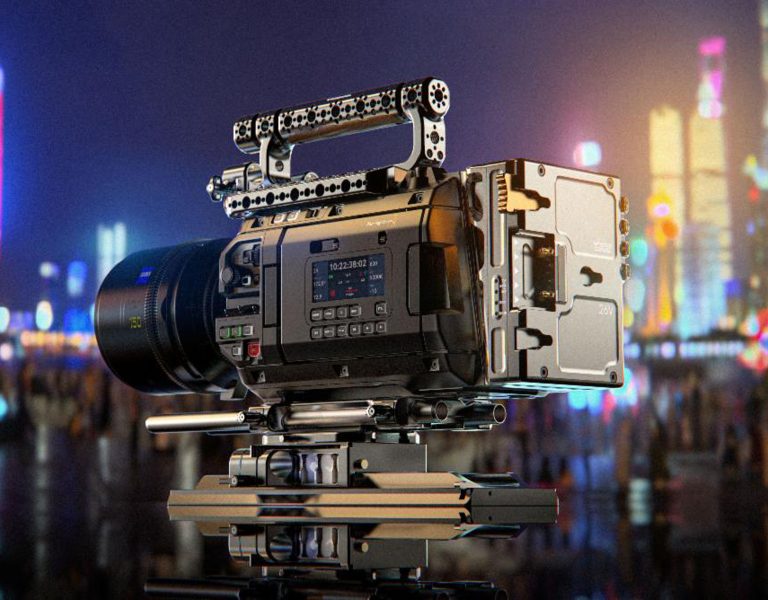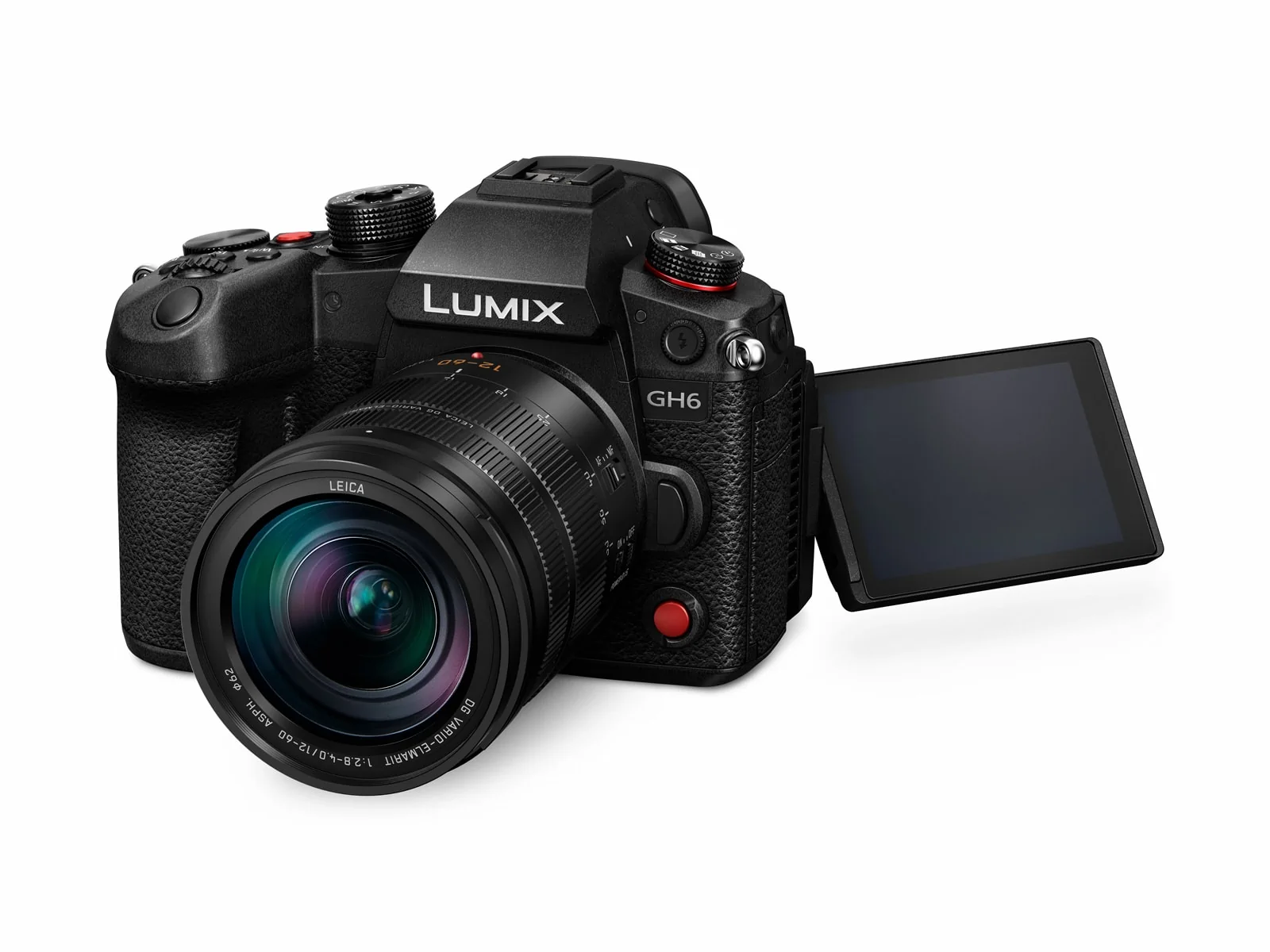
Panasonic has introduced the new LUMIX GH6 – the latest flagship model of LUMIX mirrorless cameras based on the Micro Four Thirds system standard.
In 2009, Panasonic introduced the DMC-GH1, the first model of the LUMIX GH series, with a hybrid photo/video concept. Since then, the GH series has evolved with innovative features demanded by users, and now, it has become renowned by creators worldwide as a first-choice tool thanks to its performance, mobility, and rugged design. The LUMIX GH6 is the latest addition to the series that again breaks the boundaries of mirrorless cameras.
The GH6 will be available from March 2022 for £1,999.99 RRP for body only or from £2,199.99 RRP for a kit including a 12-60mm lens.
Powerful, Professional Video Performance
Panasonic’s LUMIX GH Series is widely considered an epoch-making sensation, achieving outstanding video recording performance with advanced features that meet professional quality levels and standards. The new LUMIX GH6 continues this, with 5.7K 30p internal video recording available in ProRes 422 HQ and ProRes 422 for the first time in the LUMIX series using a CFexpress Type B card, which enables non-linear editing without transcoding.
With 5.7K 4:2:0 10-bit 60p/50p and 5.8K 30p/25p/24p 4:2:0 10-bit anamorphic 4:3 modes recorded utilising the full area of the sensor, the LUMIX GH6 offers higher resolution and higher bit rates than ever before and delivers the latest in high image quality, versatility, and range needed for film, TV, and all types of video production.
The LUMIX GH6 also achieves 4:2:2 10-bit Cinema 4K 60p internal recording as well as simultaneous output in 4:2:2 10-bit Cinema 4K 60p over HDMI.
4:2:0 10-bit 4K 120p (equivalent to 5x slow motion) and 4:2:2 10bit FHD 240p HFR (High Frame Rate) video recording with audio is available to enable creativity such as speed ramping. FHD maximum 300fps (equivalent to 12.5x slow motion) VFR (Variable Frame Rate) enables dynamic motion of a subject.
Overheating can be a fatal issue to continuous video recording especially when the resolution and the frame rates are increased but the LUMIX GH6 achieves unlimited video recording time in all modes by optimising the heat-dissipating path with a forced-cooling fan mechanism.
Panasonic’s Commitment to Continuous Improvement
Panasonic continues its commitment to continuous improvement of its LUMIX range via performance-enhancing firmware updates. In the future, a firmware update for GH6 will be released to support:
- Cinema 4K ProRes 422 HQ / ProRes 422
- FHD ProRes 422 HQ / ProRes 422
- USB-SSD direct recording
- 4K 120p HDMI Video output during Live View
- Cinema 4K 120p HDMI RAW Video Data Output to ATOMOS Ninja V+
Unrivalled Image Stabilisation
For agile handheld shooting, the LUMIX GH6 adopts a new super high-precision 5-axis gyro sensor with a new algorithm to achieve a powerful 7.5 stops of Body I.S. and Dual I.S.2.
The 5-axis Dual I.S. 2 works seamlessly to record natural, comfortable-to-see video footage. It applies appropriate compensation according to the type of movement by precisely judging the cause – whether it was generated by panning, tilting, or hand-shake. The B.I.S. compensates for camera movement even when an interchangeable lens without O.I.S. (e.g. a cine lens) is used.
With this powerful image stabilisation, even a 100-megapixel high-resolution image can be shot using the High Resolution mode without a tripod. In High Resolution mode, eight consecutive images are automatically shot while shifting the sensor using the Body I.S. (Image Stabiliser) mechanism and synthesized into a 100-megapixel equivalent (11552 x 8672-pixel) image that faithfully reproduces precise details to be saved as beautiful, highly realistic images not only in RAW but also in JPEG. With its compact, lightweight design and powerful Body I.S., the LUMIX GH6 makes shooting that was previously deemed impossible –such as handheld ultra-telephoto shooting– possible.
Incredible Dynamic Range
The LUMIX GH6 provides 12+ stops of wide dynamic range for pre-installed V-Log recording, expanding to 13+ stops when using Dynamic Range Boost mode. With the new Dynamic Range Boost mode, a highly saturated image generated from the low ISO circuit and a low noise image generated from the high ISO circuit are synthesized at each pixel. The composite image achieves both low noise and high saturation, resulting in a clear and smooth HDR video with rich gradation.
The LUMIX GH6 also contains V-Log/V-Gamut for the first time in the LUMIX G Series Micro Four Thirds camera line-up to deliver a high dynamic range with broad colours. V-Log renders a very flat image while maintaining all colour information within the image, which allows for a greater level of editing flexibility in the post-production process. The GH6’s Live MOS sensor achieves a wide colour gamut known as V-Gamut. This is the GH6’s optimum colour space, which is wider than BT.2020.
Users will enjoy the GH6’s impressively accurate colour reproduction, with subtle gradations from dark areas to highlights, and precise control of colour data in post-production.
The LUMIX GH6 imports the renowned colourimetry of the Panasonic VariCam line-up of cinema cameras. V709 LUT (Look Up Table) with Rec.709 standard is available in the camera by default. As a further convenience, for the first time, V-Log View Assist (which can apply LUTs in real-time) supports the import of .CUBE as well as .VLT file formats.
A LUMIX First in Audio Recording Capability
The LUMIX GH6 delivers much improved audio recording performance, with 4ch 48kHz or 96kHz 24-bit recording made possible when an XLR microphone adaptor is attached. This provides greater flexibility when shooting outdoors, for example, where multiple audio sources are present, or when recording backup audio. 2ch 48kHz 24-bit recording is also supported with the built-in mic as well as 2ch 96kHz 24-bit high-resolution recording with an external mic.
The channel to use for headphones can also be switched during video recording and audio menus can be directly accessed with the Fn1 button on the top of the camera to easily check sound levels during 4-channel audio recording. For an external microphone, a Φ3.5mm stereo jack is provided.
Practical Features for Easier Workflow
The LUMIX GH6 also offers a host of practical features. There are a variety of useful settings in Photo Style including different Cinelike gamma presets such as ‘Cinelike D2’ and ‘Cinelike V2’, which have similar gamma setting characteristics for film production.
In response to requests from professional users, video assist functions such as Waveform Monitor, Zebra Pattern, Luminance Spot Meter, Frame Marker, Anamorphic Desqueeze Display, Red REC Frame Indicator and Tally lamps are also available.
New to the LUMIX GH6 is the Safety Zone Marker, which shows a guide of 95%, 90% or 80% recording area, while the Center Marker allows you to choose the type of the marker. In the Colour Temperature Setting, the kelvin values can now be displayed on the recording screen
4K 60p timelapse videos can also be produced inside the camera. With the Exposure Levelling function, the exposure is automatically adjusted to prevent large changes in brightness between adjacent frames to produce equable timelapse footage.
MF assist during video recording is now supported, enabling the user to enlarge the screen up to 6x to check the focus.
Next-Generation Engine and Sensor Technology
Panasonic has developed a new 25.2-megapixel Live MOS Sensor without LPF (Low-pass Filter) that boasts high resolution, high-speed signal readout that reduces rolling shutter and achieves wide dynamic range.
The new Venus Engine is also upgraded with advanced image processing technologies to render high-resolution imagery with natural noise texture and rich colour reproduction, which is a hallmark of LUMIX cameras.
The new engine delivers approximately twice the processing power, enabling high-speed processing of the new sensor’s higher pixel counts and higher-resolution, higher-bit-rate video. This evolution includes three key technologies: New Intelligent Detail Processing, New 2D Noise Reduction, and High Precision 3D Noise Reduction for video. The new Intelligent Detail Processing detects the flat, detailed, and edged elements in a frame more accurately to produce a highly realistic image. The new 2D Noise Reduction suppresses chromatic noise and improves the texture of luminance noise to achieve clear and natural images even when shot at high sensitivity. With the High Precision 3D Noise Reduction for video, the detection capability of still and moving parts has been advanced, making it possible to optimise noise reduction while minimising afterimages. As a result, the image quality of video with dynamic motion is enhanced. In addition, high-precision Dual 3D Colour Control enhances colour reproduction by brightness level, saturation level and hue level for rich, faithful colour expression.
The combination of the new advanced sensor with enhanced saturation performance and the new engine makes it possible to render a clearer image even in 25.2-megapixel high resolution and lower minimum ISO sensitivity at ISO 100 [Photo: ISO 50(Extended) – 25600 / Video: ISO 50(Extended) -12800].
Intuitive Operability
The LUMIX GH6 adopts a 3.0-inch tilt and free-angle touch-control monitor in 3:2 aspect with 1,840K-dot high resolution. The tilt and free-angle screen allows for greater flexibility and convenient rotation even with a HDMI cable and USB cable connected to the camera.
To support high precision focusing, the LUMIX GH6 provides practical options for manual focusing. While focus is shifted with variable amount according to the rotation speed of the focus ring for non-linear setting, it is shifted with a designated amount according to the rotational quantum of the focus ring for linear setting. Sensitivity (amount of focus shift per rotational quantum) can be selected from 90 to 360 degrees by 30-degrees to enable intended focus operation.
The 3,680k-dot 0.76x live viewfinder uses a highly responsive, easy-to-see OLED display to capture even fast-moving subjects in fine detail. In addition, the high contrast display (approx. 10,000:1) presents the subject with fine gradations and high clarity throughout.
With the new sensor’s higher readout speed and the new Venus Engine’s superior processing power, the LUMIX GH6 also delivers AFS burst shooting using the electronic shutter at 75 frames per second with 25.2-megapixel resolution. The sensor’s higher readout speed also minimises rolling shutter distortion and captures images too fast for the naked eye to process.
Reliable Build Quality for Professional Use
The LUMIX GH6 is tough enough to withstand heavy field use with a magnesium alloy full die-cast front / rear frame and is not only splash-resistant but dust-resistant and freeze-resistant down to -10 degrees Celsius/14 degrees Fahrenheit. The shutter unit is also durable for approx. 200,000 cycles. The Rec button is located on both the top and front of the camera, which makes it easy to start and stop recording even when shooting at a low angle or with a shoulder rig.
The LUMIX GH6 is equipped with double card slots. The CFexpress card (Type B) supports internal recording of high bitrate video at 800Mbps or more including 5.7K 30p ProRes 422 HQ and C4K 60p ALL-I. The SD Memory Card UHS II V90 supports internal recording of video at 600Mbps or less and it is also possible to choose the recording method from Relay Recording, Backup Recording, Allocation Recording using both SD Memory Card and CFexpress Card.
For the terminal, HDMI Type A is provided. Plus, a cable lock holder for the HDMI/USB cable is provided to prevent issues such as unplugging on location. The LUMIX GH6 supports USB 3.2 Gen 2 for high-speed writing and readout. The 2200mAh high-capacity battery can be recharged either via AC or USB according to the users’ convenience. It also complies with USB PD (Power Delivery) when the corresponding Battery Charger DMW-BTC15 is used. The LUMIX GH6 is also compatible with Time Code IN/OUT synchronization through the flash synchro terminal and bundled BNC converter cable with BNC cable. This makes the non-linear editing of footage shot with multiple cameras easy.
Wi-Fi 5-GHz (IEEE802.11ac) is enabled in addition to 2.4-GHz (IEEE802.11b/g/n). This provides a secure and stable connection not only with a smartphone/tablet but also with other devices on location for smooth remote control. The transmission speed of photo/video data is also increased by using the 5-GHz band. Compatibility with Bluetooth 5.0 (called BLE: Bluetooth Low Energy) enables constant connection with a smartphone or tablet with minimum power consumption. The settings of a LUMIX GH6 camera can also be copied and transmitted wirelessly to other GH6 cameras when using multiple cameras. The LUMIX Sync application for iOS/Android devices allows remote control of the camera using a smartphone or a tablet via easy wireless connection. In addition to wireless control via a Remote Shutter DMW-RS2 (sold separately), application software LUMIX Tether enables tethered shooting via USB. Users can control the camera by connecting it to a PC via USB, letting them view the image on a large PC screen while shooting.
Wide Range of Available Lenses
The Panasonic LUMIX G Series boasts a total line-up of 30 Micro Four Thirds lenses to choose from according to purpose. The latest LEICA DG VARIO-SUMMILUX 10-25mm F1.7 ASPH. (X-H1025) and LEICA DG VARIO-SUMMILUX 25-50mm F1.7 ASPH. (H-X2550) zoom lenses feature full-range F1.7 large aperture and are favoured by professional film creators as well as other single-focal-length F1.7 or F2.8 lenses. In addition, the LUMIX GH6 memorises the name and focal length of analog lenses such as anamorphic lenses or old lenses to automatically apply the suitable setting of the camera’s in-body image stabiliser when those lenses are used.
Panasonic has reviewed and updated the firmware of its lenses to optimise their use with the LUMIX GH6. It is possible to control AF operation by pressing the shutter button halfway, or by pressing the AF-ON button, when [200.00p] is set in high frame rate video mode when H-E08018/H-X1025/H-X2550/H-ES12060/H-ES50200/H-RS100400/H-XA025/H-ES200/H-HSA12035/H-FS12060/H-HSA35100/H-FSA45200/H-FSA100300 lenses are used. The H-NS043/H-X012/H-X015 lenses will follow these updates and they will also have Focus Ring Control and improved AF performance in 24.00p/23.98p mode. The firmware update of H-NS043/H-X012/H-X015 is scheduled for 1st March 2022.
